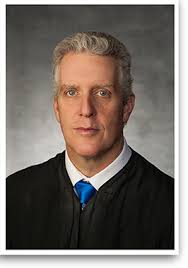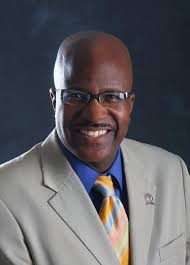

 Pictured are Democratic Ohio Supreme Court 2020 candidates Cuyahoga County Court of Common Pleas Judge John O'Donnell and Ohio Tenth District Court of Appeals Judge Jennifer Brunner, also a former Ohio secretary of state, and Cleveland Ward 9 Councilman Kevin Conwell
Pictured are Democratic Ohio Supreme Court 2020 candidates Cuyahoga County Court of Common Pleas Judge John O'Donnell and Ohio Tenth District Court of Appeals Judge Jennifer Brunner, also a former Ohio secretary of state, and Cleveland Ward 9 Councilman Kevin Conwell
Clevelandurbannews.com and Kathywraycolemanonlinenewsblog.com, Ohio's most read Black digital newspaper and Black blog. Tel: (216) 659-0473 and Email: editor@clevelandurbannews.com.
By Kathy Wray Coleman, editor-in-chief
CLEVELANDURBANNEWS.COM-COLUMBUS, Ohio-Ohio Democratic Supreme Court 2020 judicial candidates Jennifer Brunner, a Ohio 10th District Appellate Court judge and former Democratic Ohio secretary of state, and Cuyahoga County Court of Common Pleas Judge John O'Donnell, spoke front and center at the annual Ohio Democratic Party state dinner Sunday evening Oct. 15 at the Convention Center in greater Columbus, Democratic Party Chairman Tom Perez and five Democratic candidates for president also speaking, among others, including ODP Chairman David Pepper and ODP Vice-chairwoman Rhine McLin, who is Black and a former Dayton mayor.
There are two seats up for grabs next year on the Ohio Supreme Court.
Brunner is running for the seat held by incumbent Justice Judith French, who defeated O'Donnell, in 2014 and O'Donnell is set to challenge incumbent Justice Sharon Kennedy, both of French and Kennedy Republicans.
The Democratic candidates who spoke at the state dinner last night ahead of Tuesday night's Democratic debate in suburban Columbus were Pete Buttigieg, Amy Klobuchar, Tim Ryan, Tom Steyer and Andrew Yang, the lower tier candidates in fact, only Buttigieg polling in double digits nationally, and Ryan, a Youngstown, Ohio area Democrat, failing to qualified for the upcoming debate of 12 candidates.
Front runners vice president Joe Biden and U.S. Sens Elizabeth and Bernie Sanders were not in attendance, and neither were U.S. Rep. Tulsi Gabbard, who says the Democratic primary for president is rigged, and U.S. Sens. Kamala Harris and Cory Booker, the only Blacks in the race for president.
All of aforementioned candidates, as well as the five Democratic presidential candidates in attendance at the state dinner, are expected at Tuesday's Democratic debate in Westerville, Ohio, a Columbus suburb.
Judge O'Donnell narrowly lost bids to the state's high court, first in 2014 against Justice Judith French, and again in 2016 against Justice Pat Fischer, the latter by some 24,000 votes, and after he acquitted since fired Cleveland cop Michael Brelo of voluntary manslaughter of two unarmed Black suspects in 2015.
His bench trial verdict drre protests and some 71 civil disobedience arrests, and outcries from community activists and Black members of Cleveland City Council, led by Democratic Cleveland Councilman Kevin Conwell.
ODP leaders want O'Donnell on the state's highest court, controversy aside, including claims he aided JPMorgan Chase Bank and others in stealing homes from Black Cuyahoga County residents via illegal foreclosures, and then retaliated when they complained, allegedly with the help of crooked cops, the county sheriff's office, his judicial colleagues on the common pleas bench and area municipal court benches, county officials, and other culprits.
Regardless, the Dems say he is best suited to help them work to turn the seven -member majority Republican Ohio Supreme Court, now with five Republicans and two Democrats, Democratic, both O'Donnell and Brunner needing to win to pull off such an upset in 2020.
And Brunner is no joke either, her candidacy also a threat to the Republican political regime in Ohio.
"So goes Ohio, so goes the nation," said Brunner during her state dinner speech Sunday, a speech that highlighted the work of the late Rev. Dr Martin Luther King Jr. and the Civil Rights Act of 1964. "Twent-twenty depends on us."
The likable Judge Brunner said Democracy is fragile and "only as good and true as what the people believe it to be," the Ohio Supreme Court poised to take on issues from voting and reproductive rights to eminent domain cases, death penalty matters, and congressional gerrymandering.
O'Donnell took on President Trump as if he were running against him, and not as a candidate for the state's high court, the articulate judge poking fun at Trump's twitter rapages and his mediocre spelling and grammar.
But he said the main reason Trump should be voted out of office is his "constant degradation of the judiciary, a co-equal independent branch of government."
The judge said that the president treats "the judiciary as servants to his party and their policies."
The controversial O'Donnell also used his speech to criticize Chief Justice Maureen O'Connor, a popular Republican and former lieutenant governor, and the first woman chief justice of the court.
O'Donnell said that that O'Connor purportedly said her job as chief justice is to "serve as the backstop for Republican legislation."
Both Brunner and O'Donnell asked the audience to support them in their bids next year for the Ohio Supreme Court, a policy-making court with only one Black, Democratic Justice Melody Stewart, a former 8th District Court of Appeals judge the first Black and first Black female elected to the Ohio Supreme Court, Stewart last year winning one of the two seats on the court that are now held by Democrats, along with former Cuyahoga County Court of common Pleas judge Michael Donnelly.

















